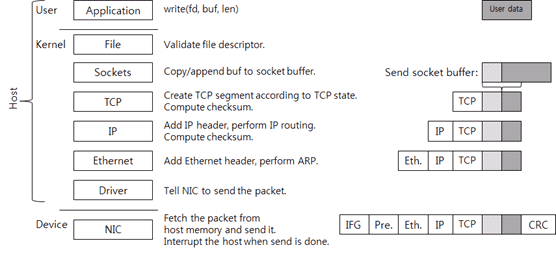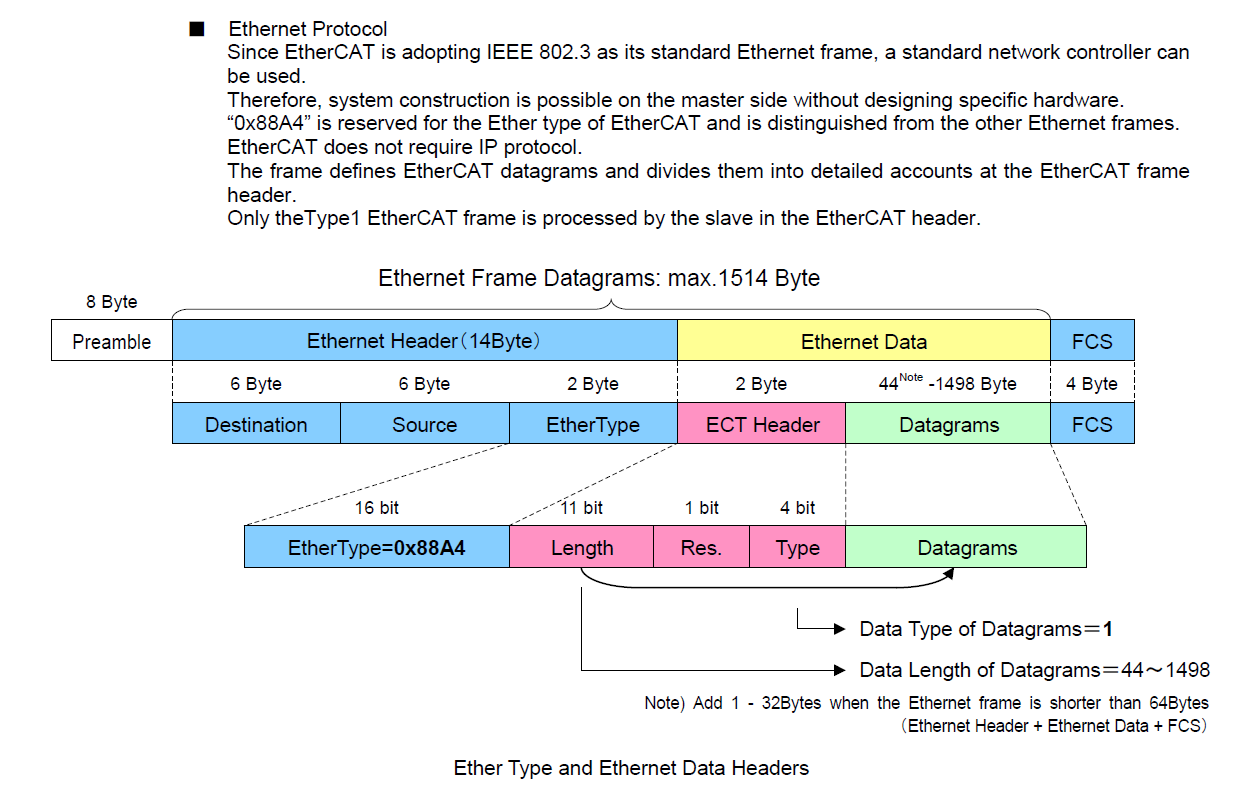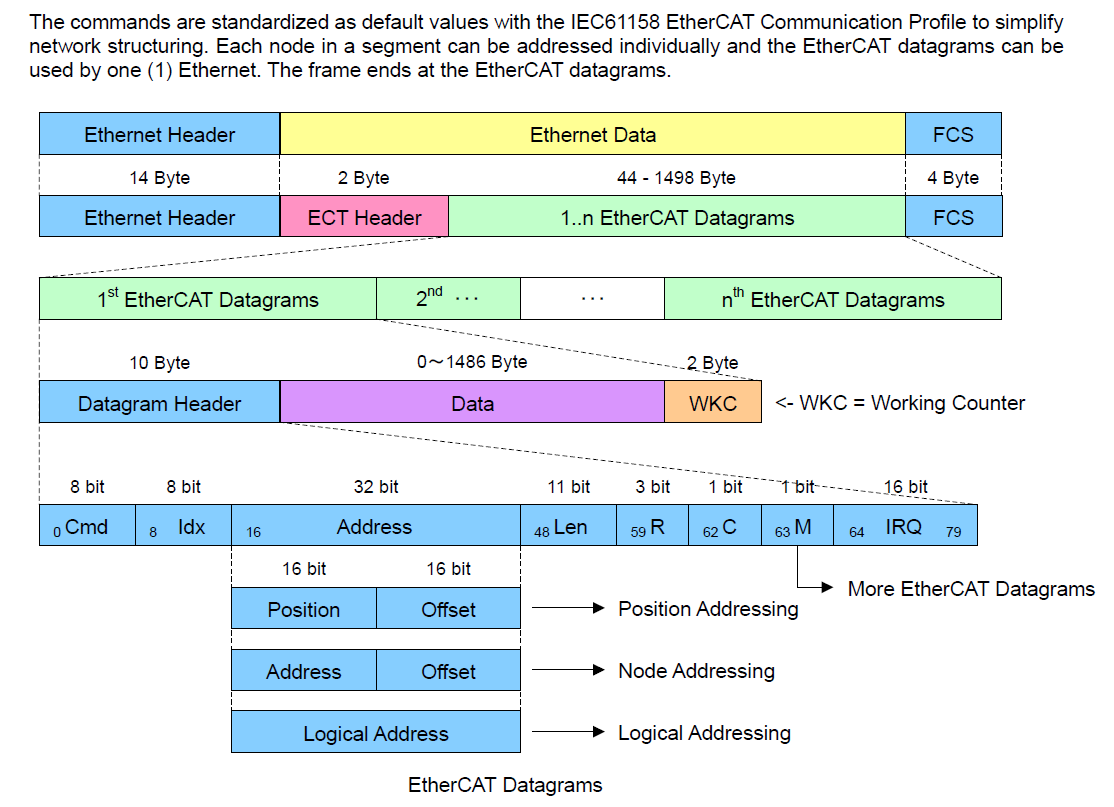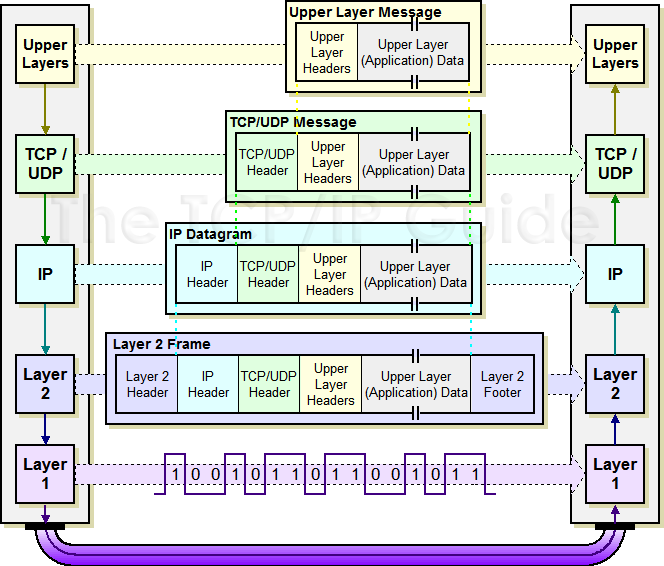Linux 的网络结构如图:
see link: http://www.cubrid.org/blog/dev-platform/understanding-tcp-ip-network-stack/
在 Driver 层只负责数据的收发,而上层则负责 Network Stack 的处理。
如果不想发送 TCP/IP 数据帧,可以创建 raw socket (man 7 packet),自己构造以太网协议头部,再通过 Driver 层发送。
通过 raw socket 可以发送以下两种数据包:
发送接收ip数据包
socket(AF_INET, SOCK_RAW, IPPROTO_TCP|IPPROTO_UDP|IPPROTO_ICMP)
发送接收以太网数据帧 (更底层)
socket(PF_PACKET, SOCK_RAW, htons(ETH_P_IP|ETH_P_ARP|ETH_P_ALL))
例如,可以通过 raw socket 发送 ethercat 帧:
Ethercat 属于 Ethernet 中的一种, 其 Ethrenet 帧中头部的 EtherType 为 0x88A4,然后将 IP 和 TCP 部分全部用 Ethercat 数据报文替换掉,这样就变成了 Ethercat 报文了。
以下是Ethernet的数据结构:
以下是Ethercat的数据结构:
以下是 TCP/IP 数据帧结构:
查看 TCP/IP 和 Ethercat 的 wireshark 抓包结果: http://blog.csdn.net/GW569453350game/article/details/53213431
一个简单的 Network Deriver 实现(没有连接实际的pci设备):
完整代码:
#include <linux/module.h>
#include <linux/netdevice.h>
#include <linux/etherdevice.h>
#include <linux/ip.h>
/* for in_device, in_ifaddr */
#include <linux/inetdevice.h>
MODULE_AUTHOR("Brook");
MODULE_DESCRIPTION("Kernel module for demo");
MODULE_LICENSE("GPL");
#define MAX_ETH_FRAME_SIZE 1792
struct nic_priv {
/* you can use array to queue more packet */
unsigned char *tx_buf;
unsigned int tx_len;
u32 msg_enable;
};
static struct net_device *nic_dev[2];
/* netif msg type, defined in netdevice.h
NETIF_MSG_DRV = 0x0001,
NETIF_MSG_PROBE = 0x0002,
NETIF_MSG_LINK = 0x0004,
NETIF_MSG_TIMER = 0x0008,
NETIF_MSG_IFDOWN = 0x0010,
NETIF_MSG_IFUP = 0x0020,
NETIF_MSG_RX_ERR = 0x0040,
NETIF_MSG_TX_ERR = 0x0080,
NETIF_MSG_TX_QUEUED = 0x0100,
NETIF_MSG_INTR = 0x0200,
NETIF_MSG_TX_DONE = 0x0400,
NETIF_MSG_RX_STATUS = 0x0800,
NETIF_MSG_PKTDATA = 0x1000,
NETIF_MSG_HW = 0x2000,
NETIF_MSG_WOL = 0x4000,
*/
#define DEF_MSG_ENABLE 0xffff
static void dump(unsigned char *buf)
{
unsigned char *p, sbuf[2*(sizeof(struct ethhdr) + sizeof(struct iphdr))];
int i;
p = sbuf;
for(i = 0; i < sizeof(struct ethhdr); i++) {
p += sprintf(p, "%02X ", buf[i]);
}
printk("eth %s\n", sbuf);
p = sbuf;
for(i = 0; i < sizeof(struct iphdr); i++) {
p += sprintf(p, "%02X ", buf[sizeof(struct ethhdr) + i]);
}
printk("iph %s\n", sbuf);
p = sbuf;
for(i = 0; i < 4; i++) {
p += sprintf(p, "%02X ", buf[sizeof(struct ethhdr) + sizeof(struct iphdr) + i]);
}
printk("payload %s\n", sbuf);
}
static void
nic_rx(struct net_device *netdev, int len, unsigned char *buf)
{
struct sk_buff *skb;
struct nic_priv *priv = netdev_priv(netdev);
netif_info(priv, hw, netdev, "%s(#%d), rx:%d\n",
__func__, __LINE__, len);
/*
* The packet has been retrieved from the transmission
* medium. Build an skb around it, so upper layers can handle it
*/
skb = dev_alloc_skb(len + 2);
if (!skb) {
netif_err(priv, rx_err, netdev,
"%s(#%d), rx: low on mem - packet dropped\n",
__func__, __LINE__);
netdev->stats.rx_dropped++;
return;
}
skb_reserve(skb, 2); /* align IP on 16B boundary */
memcpy(skb_put(skb, len), buf, len);
/* Write metadata, and then pass to the receive level */
skb->dev = netdev;
skb->protocol = eth_type_trans(skb, netdev);
skb->ip_summed = CHECKSUM_UNNECESSARY; /* don't check it */
netdev->stats.rx_packets++;
netdev->stats.rx_bytes += len;
netif_rx(skb);
}
static int nic_open(struct net_device *netdev)
{
struct nic_priv *priv = netdev_priv(netdev);
netif_info(priv, ifup, netdev, "%s(#%d), priv:%p\n",
__func__, __LINE__, priv);
/* may be using DMA */
priv->tx_buf = kmalloc(MAX_ETH_FRAME_SIZE, GFP_KERNEL);
if (priv->tx_buf == NULL) {
netif_info(priv, ifup, netdev, "%s(#%d), cannot alloc tx buf\n",
__func__, __LINE__);
return -ENOMEM;
}
netif_start_queue(netdev);
return 0;
}
static int nic_close(struct net_device *netdev)
{
struct nic_priv *priv = netdev_priv(netdev);
netif_info(priv, ifdown, netdev, "%s(#%d), priv:%p\n",
__func__, __LINE__, priv);
netif_stop_queue(netdev);
return 0;
}
static void nic_hw_xmit(struct net_device *netdev)
{
struct nic_priv *priv = netdev_priv(netdev);
struct iphdr *iph;
u32 *saddr, *daddr;
struct in_device* in_dev;
struct in_ifaddr* if_info;
if (priv->tx_len < sizeof(struct ethhdr) + sizeof(struct iphdr)) {
netif_info(priv, hw, netdev, "%s(#%d), too short\n",
__func__, __LINE__);
return;
}
dump(priv->tx_buf);
iph = (struct iphdr *)(priv->tx_buf + sizeof(struct ethhdr));
saddr = &iph->saddr;
daddr = &iph->daddr;
netif_info(priv, hw, netdev, "%s(#%d), orig, src:%pI4, dst:%pI4, len:%d\n",
__func__, __LINE__, saddr, daddr, priv->tx_len);
in_dev = nic_dev[(netdev == nic_dev[0] ? 1 : 0)]->ip_ptr;
if (in_dev) {
if_info = in_dev->ifa_list;
for (if_info = in_dev->ifa_list; if_info; if_info=if_info->ifa_next) {
#if 0
printk("label:%s, address=%pI4\n",
if_info->ifa_label, &if_info->ifa_address);
#endif
*saddr = *daddr = if_info->ifa_address;
((u8 *)saddr)[3]++;
netif_info(priv, hw, netdev, "%s(#%d), new, src:%pI4, dst:%pI4\n",
__func__, __LINE__, saddr, daddr);
break;
}
if (!if_info) {
/* drop packet */
netdev->stats.tx_dropped++;
netif_info(priv, hw, netdev, "%s(#%d), drop packet\n",
__func__, __LINE__);
return;
}
}
iph->check = 0; /* and rebuild the checksum (ip needs it) */
iph->check = ip_fast_csum((unsigned char *)iph, iph->ihl);
netdev->stats.tx_packets++;
netdev->stats.tx_bytes += priv->tx_len;
nic_rx(nic_dev[(netdev == nic_dev[0] ? 1 : 0)], priv->tx_len, priv->tx_buf);
}
static netdev_tx_t nic_start_xmit(struct sk_buff *skb,
struct net_device *netdev)
{
struct nic_priv *priv = netdev_priv(netdev);
netif_info(priv, drv, netdev, "%s(#%d), orig, src:%pI4, dst:%pI4\n",
__func__, __LINE__, &(ip_hdr(skb)->saddr), &(ip_hdr(skb)->daddr));
priv->tx_len = skb->len;
if (likely(priv->tx_len < MAX_ETH_FRAME_SIZE)) {
if (priv->tx_len < ETH_ZLEN) {
memset(priv->tx_buf, 0, ETH_ZLEN);
priv->tx_len = ETH_ZLEN;
}
skb_copy_and_csum_dev(skb, priv->tx_buf);
dev_kfree_skb_any(skb);
} else {
dev_kfree_skb_any(skb);
netdev->stats.tx_dropped++;
return NETDEV_TX_OK;
}
nic_hw_xmit(netdev);
return NETDEV_TX_OK;
}
static int nic_validate_addr(struct net_device *netdev)
{
struct nic_priv *priv = netdev_priv(netdev);
netif_info(priv, drv, netdev, "%s(#%d), priv:%p\n",
__func__, __LINE__, priv);
return eth_validate_addr(netdev);
}
static int nic_change_mtu(struct net_device *netdev, int new_mtu)
{
struct nic_priv *priv = netdev_priv(netdev);
netif_info(priv, drv, netdev, "%s(#%d), priv:%p\n",
__func__, __LINE__, priv);
return eth_change_mtu(netdev, new_mtu);
}
static int nic_set_mac_addr(struct net_device *netdev, void *addr)
{
struct nic_priv *priv = netdev_priv(netdev);
netif_info(priv, drv, netdev, "%s(#%d), priv:%p\n",
__func__, __LINE__, priv);
return eth_mac_addr(netdev, addr);
}
/*
* This function is called to fill up an eth header, since arp is not
* available on the interface
*/
int snull_header(struct sk_buff *skb, struct net_device *netdev,
unsigned short type, const void *daddr, const void *saddr,
unsigned len)
{
struct nic_priv *priv = netdev_priv(netdev);
struct ethhdr *eth = (struct ethhdr *)skb_push(skb, ETH_HLEN);
struct net_device *dst_netdev;
netif_info(priv, drv, netdev, "%s(#%d)\n",
__func__, __LINE__);
dst_netdev = nic_dev[(netdev == nic_dev[0] ? 1 : 0)];
eth->h_proto = htons(type);
memcpy(eth->h_source, saddr ? saddr : netdev->dev_addr, netdev->addr_len);
memcpy(eth->h_dest, dst_netdev->dev_addr, dst_netdev->addr_len);
return (netdev->hard_header_len);
}
static const struct header_ops snull_header_ops = {
.create = snull_header,
};
static const struct net_device_ops nic_netdev_ops = {
/* Kernel calls ndo_open() and ndo_validate_addr()
* when you bring up the NIC
*/
.ndo_open = nic_open,
.ndo_validate_addr = nic_validate_addr,
/* when you shut down the NIC, kernel call the .ndo_stop() */
.ndo_stop = nic_close,
/* Kernel calls ndo_start_xmit() when it wants to
* transmit a packet.
*/
.ndo_start_xmit = nic_start_xmit,
/* ndo_change_mtu() is called, when you change MTU */
.ndo_change_mtu = nic_change_mtu,
/* ndo_set_mac_address() is called,
* when you change the MAC addr
*/
.ndo_set_mac_address = nic_set_mac_addr,
};
static struct net_device* nic_alloc_netdev(void)
{
struct net_device *netdev;
netdev = alloc_etherdev(sizeof(struct nic_priv));
if (!netdev) {
pr_err("%s(#%d): alloc dev failed",
__func__, __LINE__);
return NULL;
}
eth_hw_addr_random(netdev);
netdev->netdev_ops = &nic_netdev_ops;
/* keep the default flags, just add NOARP */
netdev->flags |= IFF_NOARP;
/* There are no explicit users, so this is
* now equivalent to NETIF_F_HW_CSUM. */
netdev->features |= NETIF_F_HW_CSUM;
netdev->header_ops = &snull_header_ops;
return netdev;
}
static int __init brook_init(void)
{
int ret;
struct nic_priv *priv;
nic_dev[0] = nic_alloc_netdev();
if (!nic_dev[0]) {
pr_err("%s(#%d): alloc netdev[0] failed", __func__, __LINE__);
return -ENOMEM;
}
nic_dev[1] = nic_alloc_netdev();
if (!nic_dev[1]) {
pr_err("%s(#%d): alloc netdev[1] failed", __func__, __LINE__);
ret = -ENOMEM;
goto alloc_2nd_failed;
}
ret = register_netdev(nic_dev[0]);
if (ret) {
pr_err("%s(#%d): reg net driver failed. ret:%d",
__func__, __LINE__, ret);
goto reg1_failed;
}
ret = register_netdev(nic_dev[1]);
if (ret) {
pr_err("%s(#%d): reg net driver failed. ret:%d",
__func__, __LINE__, ret);
goto reg2_failed;
}
priv = netdev_priv(nic_dev[0]);
priv->msg_enable = DEF_MSG_ENABLE;
priv = netdev_priv(nic_dev[1]);
priv->msg_enable = DEF_MSG_ENABLE;
return 0;
reg2_failed:
unregister_netdev(nic_dev[0]);
reg1_failed:
free_netdev(nic_dev[1]);
alloc_2nd_failed:
free_netdev(nic_dev[0]);
return ret;
}
module_init(brook_init);
static void __exit brook_exit(void)
{
int i;
pr_info("%s(#%d): remove module", __func__, __LINE__);
for (i = 0; i < ARRAY_SIZE(nic_dev); i++) {
unregister_netdev(nic_dev[i]);
free_netdev(nic_dev[i]);
}
}
module_exit(brook_exit);Makefile 文件:
#netdriver.ko
obj-m += netdriver.o #指定编译模块名称,会自动寻找 netdriver.c
CURRENT_PATH:=$(shell pwd)
LINUX_KERNEL:=$(shell uname -r)
#EXTRA_CFLAGS = -std=c99
LINUX_KERNEL_PATH:=/usr/src/linux-headers-3.4.6-xenomai-2.6.3 #内核源码目录
#LINUX_KERNEL_PATH:=/lib/modules/`uname -r`/build
all:
make -C $(LINUX_KERNEL_PATH) M=$(CURRENT_PATH) modules #C进入内核目录读取Makefile,M表明后回到当前目录读取Makefile
clean:
make -C $(LINUX_KERNEL_PATH) M=$(CURRENT_PATH) clean 然后就可以测试了:
modinfo netdriver.ko
sudo modeprob netdriver.ko // 如有别的模块有依赖此模块, sudo depmod netdriver.ko
dmesg
sudo modprobe -r netdriver.ko // 卸载模块好文齐分享:
1. https://blog.packagecloud.io/eng/2016/10/11/monitoring-tuning-linux-networking-stack-receiving-data-illustrated/
2. https://blog.packagecloud.io/eng/2016/06/22/monitoring-tuning-linux-networking-stack-receiving-data/
3. https://blog.packagecloud.io/eng/2017/02/06/monitoring-tuning-linux-networking-stack-sending-data/
其他参考:
- http://nano-chicken.blogspot.com/2016/02/linux-kernel161-network-device-driver.html
- http://www.tldp.org/LDP/LG/issue93/bhaskaran.html
- http://linuxgazette.net/156/jangir.html
- http://www.linuxjournal.com/article/7353?page=0,1
- http://www.qnx.com/developers/docs/6.3.2/ddk_en/network/writing.html
- https://blackfin.uclinux.org/doku.php?id=linux-kernel:drivers:netdev
- http://free-electrons.com/doc/network-drivers-lab.pdf
- https://www.apriorit.com/dev-blog/195-simple-driver-for-linux-os
- http://www.etherlab.org/download/ethercat/ethercat-1.5.2.pdf



























 820
820











 被折叠的 条评论
为什么被折叠?
被折叠的 条评论
为什么被折叠?








